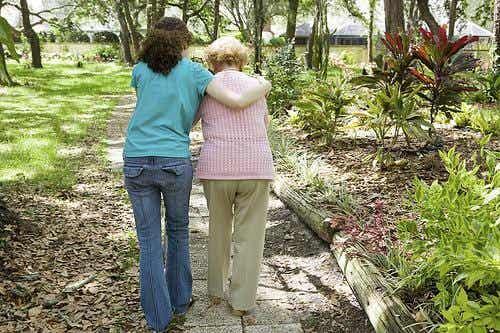
Last update: February 05, 2015
In all families it happens. Human beings are fragile, and when we least expect it, a close relative of ours may have an accident or be struck by a disabling disease, temporarily or permanently, and it may be up to us to take care of him. Even older members of our family may need our care and assistance at any moment.
The best option is always for a sick person to be cared for by someone close to him, and it is wonderful that it is possible. However, it must also be recognized that this can be a major challenge for those who take this responsibility. It can change our routine and take us out of our comfort zone abruptly.
One of the challenges of the take care of others it is precisely that of not forgetting our physical and emotional needs.
To be or not to be
Victor Frankl, a psychiatrist who managed to survive the horrendous Nazi holocaust, said that what not even the most terrible life experiences can take away from us is "the possibility of choosing how to live and how to deal with what happens to us". This means that, even if we don't always understand it, we actually have the freedom to choose what we want to do with what life puts us in front of.
At first, an unexpected and painful situation can hit us and cause confusion and shock, it is normal because there are many new things that we have to learn to manage: the daily routine, the limits and the emotional vortex we experience when we see a loved one in certain conditions, as well as the awareness of what has happened in our life .
HoweverOnce we manage to overcome this shock phase and establish a new routine, it is time to define our existential attitude. What are our options?
- Not accepting the situation leads to feelings of anger, frustration, sadness and helplessness. Even if it is human to feel distressed and have a feeling of rejection in the face of something negative, if this attitude is maintained over time, the result will be a condition of chronic stress and emotional consumption, which will affect both our health and our capacity. to take care of the other.
- Accepting the situation as a moral obligation would actually be a superficial, halfway acceptance, since we would be torn between wanting and duty: this implies taking responsibility without enthusiasm or heart, so we would not be doing a favor either to ourselves or to the person we have to care for.
- Accepting the situation as an opportunity to grow and come out stronger is the wisest attitude, which will help us relieve the weight we carry and keep our mood more relieved. If we manage, despite the situation asking a lot of us, to maintain an inner harmony, we will be able to radiate this positive attitude also to our loved one and both benefit from it.
How to take care of ourselves?
It is not uncommon for those who care for someone else to be so immersed in their role as a carer for a loved one that they start forget about himself, and you reach a dangerous level of physical and / or emotional exhaustion. There are some secrets to avoiding exhaustion preventing us from continuing to perform our task at our best:
- Recognize our limitations: understand that we cannot do everything and that we are human.
- Ask for material and emotional help when we need it, to family or friends. We can ask that they replace us in the care of the sick or that they assist us in some tasks, for example by going shopping or bringing us something we need. From an emotional point of view, many times we need to let off steam with someone who listens to us and who understands us, or simply who can make us laugh and distract us.
- Surround ourselves with a team of competent professionals, as doctors, nurses or therapists worthy of our trust, who are good people and who make us feel safe and secure that our loved one is in good hands.
- Also seek psychological help it's a good option, since it allows us to have a guaranteed space in which to circulate our emotions and reflect on the meaning of what is happening to us.
- Rediscover spirituality: whatever our creed, it can be a source of inspiration and transcendence, helping us to overcome difficult times, to make sense of the situation and to constantly renew ourselves.
Nothing happens without a reason: we have to learn a lesson from every situation we are called to face, and… Who knows? Maybe in the end we will discover that life has given us a great lesson when it entrusted us with the task of looking after a loved one. He not only taught us to take care of others, but also to do it with ourselves.
Image courtesy of Rosie O'Beirne


























